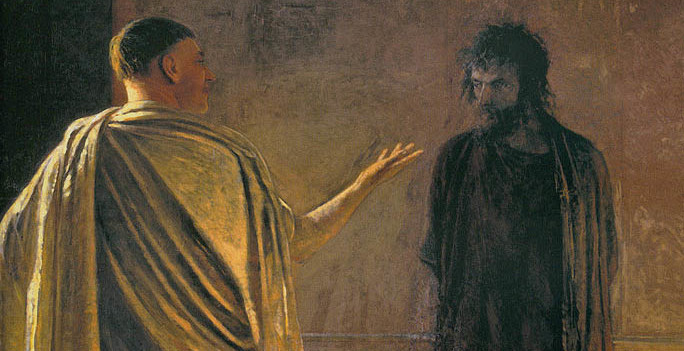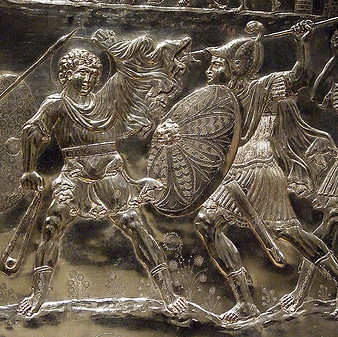
“What is truth?” Christ and Pilatus
1890, oil on canvas
There is an interesting objection to the reliability of the Gospels centered on the problem of private conversations. There are several interactions, the objection goes, wherein the details of the events are privy only to the participants of those events. The writers of the Gospels neither participated themselves in these events nor plausibly had access to witnesses of these event. Consider for example the following conversation between Jesus and Pilate from the Gospel according to John.
Pilate entered again into the Praetorium, and summoned Jesus and said to Him, “Are You the King of the Jews?”
Jesus answered, “Are you saying this on your own initiative, or did others tell you about Me?”
Pilate answered, “I am not a Jew, am I? Your own nation and the chief priests delivered You to me; what have You done?”
Jesus answered, “My kingdom is not of this world. If My kingdom were of this world, then My servants would be fighting so that I would not be handed over to the Jews; but as it is, My kingdom is not of this realm.”
Therefore Pilate said to Him, “So you are a king?”
Jesus answered, “You say correctly that I am a king. For this I have been born, and for this I have come into the world, to testify to the truth. Everyone who is of the truth hears My voice.”
Pilate said to Him, “What is truth?”
John 18:33-38 (NASB)
This is a pretty detailed account for a guy who was not there to hear the conversation. Could it be the case that the author of John wove this vignette from whole cloth? Before we jump to that conclusion, let’s survey the potential candidates for John’s information.
The Witnesses
First, Pilate would have the information regarding this information. Is it likely, however, that he would willingly participate in an interview with the early Christians? Admittedly, I am not an expert in this area, but it does seem highly improbable that a man of Pilate’s stature and background would take time out of his day to tell some fisherman what he discussed with their murdered Messiah. I think we can safely assume Pilate was not John’s source.
Second, there may have been bystanders. The text is unclear as to how private this conversation actually was. The term Praetorium is sometimes translated as “palace” or “headquarters” indicating that this was a large building presumably occupied with many of Pilate’s servants as well as military personnel. It does seem slightly unlikely that Pilate would take a criminal into a completely private room without any security. Thus, it is throughly plausible that a member of Pilate’s court overheard the entirety of the conversation, later converted, and shared their story with the believing community. Over time, this permeated into the oral tradition and eventually became encapsulated in John’s Gospel. While this is less of a stretch than John interviewing Pilate, it does seem slightly ad hoc.
Lastly, we have Jesus. Jesus would certainly have the relevant information about the conversation seeing as he was a participant. Moreover, Jesus certainly would not have a problem talking to John or any of the other disciples about what happened. In other words, Jesus was not a hostile witness. He seems to be the perfect candidate. Why would he not be considered a legitimate option? Here, we reach the crux of the problem.
Analysis
The problem that a sceptic is going to have with Jesus being the witness is that Jesus was killed after this conversation, before he could tell anybody else. But, notice how this is circular! The only reason that Jesus could be invalidated from being a witness would be if he did not rise from the dead. But, if he did not rise of the dead, then the Gospels are not telling a true story in the first place. In other words, to raise this objection to the veracity of the Gospels requires assuming the Gospels are not veracious in the first place.
But isn’t the Christian reasoning in a circle, too? Isn’t she assuming the Gospels are true to defend the Gospels are true? Here, we need to clarify that the objection is an internal critique.
You Christians have an inconsistency in your source documents. You claim they are eyewitness testimonies, but even on your own view, there isn’t an eyewitness to this conversation!
On this count, the Christian can retort that she has the explanatory resources to remain internally consistent. Since the Gospels were written after the resurrection of Christ and the 40 days of teaching described in Luke 24, Jesus is a legitimate source to fill in some of the gaps, particularly during the Passion Week events. Note that the scope of this response is limited to internal consistency.
What’s the point? It means that the “covert conversation challenge” is not an independent objection to the veracity of the Gospels; rather, it is dependent on an objection to the resurrection of Christ: whether that is a general philosophical argument against miracles or specific historical case.
Originally posted on Think Theism.





